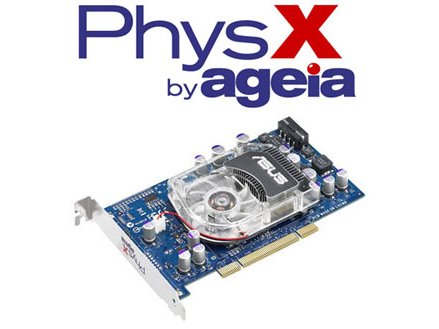Ageia launches mobile physics chip
Controversial physics accelerator heading for laptop PCs

Sign up for breaking news, reviews, opinion, top tech deals, and more.
You are now subscribed
Your newsletter sign-up was successful
Thought Ageia's controversial physics processing chip was almost history? Think again. The company has just announced its first mobile physics processor designed for laptop PCs.
Known as the PhysX 100M, the new chip was unveiled at the Games Convention in Leipzig, Germany. Dell and Medion will be the first companies to offer the PhysX 100M in their notebook PCs. For laptop implementation, the PhysX 100M is mounted on MXM PCIe modules. That's the mobile PCI Express form factor created by Nvidia primarily to support graphics cards.
It's likely, therefore, that any notebook with a mobile Physx chip will pack two MXM modules, one each for the PhysX 100M and a 3D processor.
PhysX 100M for larger screens
With that in mind, we reckon the PhysX 100M will initially only be found in beasts with 17-inch and larger screens. Don't expect it to turn up inside thin and light 14 inchers any time soon.
The idea behind a dedicated physics processor is simple enough: significantly improved gaming realism. Detailed explosions, complex character models with lifelike animation, virtual materials such as cloth that hangs and tears convincingly - all of this and more is possible with a PhysX card, according to Ageia.
However, to date the real-world benefit of the Ageia's existing desktop PhysX chip has been dubious at best. For starters, only a handful of high quality games that support PhysX have been released. That's despite the launch of the first PhysX adapters over a year ago.
Games that do support PhysX, such as Ghost Recon: Advanced Warfighter, have been criticised for offering little or no apparent improvement in physics realism.
Sign up for breaking news, reviews, opinion, top tech deals, and more.
Ageia v AMD and Nvidia
Ageia is also up against some pretty stiff competition from AMD and Nvidia. Both companies are developing hardware physics processing solutions based on their existing graphics processors. What's more, multi-core PC processors are becoming more and more popular. In that context, it's arguable whether a dedicated chip for physics is necessary.
Indeed, no less a game-development luminary than John Carmack (best known as the brains behind the Doom and Quake series of hardcore 3D shooters) has opined that dedicated physics chips are pretty much pointless.
"I am not a believer in dedicated PPUs (Physics Processing Units)," Carmack said back in July. "Multiple CPU cores will be much more useful in general. But when GPUs finally get reasonably fine grained context switching and scheduling, some tasks will work well there." So there you go.
Technology and cars. Increasingly the twain shall meet. Which is handy, because Jeremy (Twitter) is addicted to both. Long-time tech journalist, former editor of iCar magazine and incumbent car guru for T3 magazine, Jeremy reckons in-car technology is about to go thermonuclear. No, not exploding cars. That would be silly. And dangerous. But rather an explosive period of unprecedented innovation. Enjoy the ride.